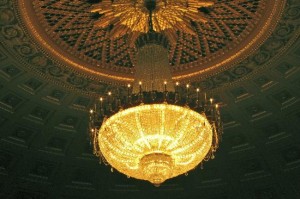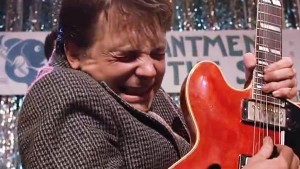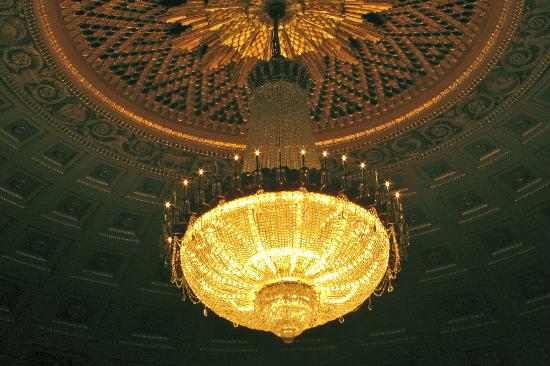A New Reality?
 This past weekend, I had the unique opportunity to experience two very different concerts on two consecutive evenings–and both took place in the same venue, Kodak Hall at Eastman Theatre. The featured groups were the innovative cello rock band (yes, you read that right) Break of Reality, performing everything from Bach 6 to hardcore heavy metal, and the Rochester Philharmonic Orchestra, performing a little-known piece by Lili Boulanger and the ever-powerful Beethoven 9. Needless to say, the experience of attending both performances within the same twenty-four hours was a definite break in my reality as a classical cellist, and so I felt compelled to enumerate it here.
This past weekend, I had the unique opportunity to experience two very different concerts on two consecutive evenings–and both took place in the same venue, Kodak Hall at Eastman Theatre. The featured groups were the innovative cello rock band (yes, you read that right) Break of Reality, performing everything from Bach 6 to hardcore heavy metal, and the Rochester Philharmonic Orchestra, performing a little-known piece by Lili Boulanger and the ever-powerful Beethoven 9. Needless to say, the experience of attending both performances within the same twenty-four hours was a definite break in my reality as a classical cellist, and so I felt compelled to enumerate it here.
I am ashamed to confess that I had never heard Break of Reality’s work (although I had heard of them) prior to Thursday morning, when I attended a workshop they presented at Eastman. After a brief performance, they related the group’s humble origins in an Eastman orchestra rehearsal (justifying the idea that it is sometimes okay to talk in orchestra) and, after some growing pains, became an in-demand band that is truly one-of-a-kind. I was especially intrigued by the concept of “cello rock”–something I have barely dabbled in myself–and so looked forward to their Friday night concert with much enthusiasm.
From the moment I entered Kodak Hall, however, I felt oddly disoriented. The atmosphere was markedly different than that of an average Eastman concert; the crowds seemed larger, the chatter was louder, and penetrating strains of a pre-concert recording loop emanated from the dimly-lit stage. Just after 8:00, the group–three cellists plus a percussionist–emerged to tumultuous applause. Without so much as an introduction (which took me by surprise, considering there were no programs), they launched into their first piece before the applause had even faded–a significant contrast to the usual enter-the-conductor, endure-a-minute-of-silence routine typical of most orchestra concerts. Thus transpired one of the most interesting two hours of my cellistic career. The group not only jammed out exuberantly on heavy metal and indie rock songs; they did a beautiful arrangement of the Bach 6 Sarabande (which I suspect is easier to play with three cellos than with one), presented an impressive improvisation, invited a contingent of guest artists to join them on stage (which included a very talented twelve-year-old student), and concluded with an all-out, slam-dunk, in-your-face show stopper. Indeed, the most shocking moment of the night occurred in this riveting closing number, when one of the members, a tall and athletic cellist named Patrick Laird, got up out of his chair, ran into the center of the extended stage (a yellow spotlight came down to illuminate him), and quite literally “rocked out,” with such energy, ebullience and exuberance that I feared for the stability of Kodak Hall’s grand chandelier. I had honestly never seen a cello performed in that manner–he was not quite standing, but he was not quite sitting, either. Between the electronic amplification, sonorous intensity, and dramatic presentation, I could not help but picture that scene in “Back to the Future” where Marty McFly plays “Johnny B. Goode” at his parents’ high school prom (the fact that this was the only image that came to mind demonstrates how rarely I attend these types of concerts).
 The most interesting aspect of my experience at the performance, however, was the uncertainty I felt as an audience member. Normally when I attend a concert in Eastman Theatre, I know what to expect. But this time, the entire concert experience was foreign to me, both in terms of its content and its presentation. I knew little about the popular styles presented; I knew even less about cello rock. Moreover, the multicolored stage lights, casting the ensemble in a luminescent rainbow, dispelled any presupposed notion of formality. Here, there was no barrier between the performers and the audience, no unspoken protocols or elaborate formalwear; there was simply a performance, so tangible and enchanting that one could almost feel the group’s collective sonority sliding off the extended stage and into the seats of Kodak Hall. Reveling in uniqueness of it all, I realized that this must be how someone with little experience of classical music feels attending an orchestra concert–a wary traveler in an unknown land. It underlined for me the importance of having a welcoming and comfortable atmosphere in the concert hall, and the dangers of allowing the modern classical concert to become an all-inclusive affair.
The most interesting aspect of my experience at the performance, however, was the uncertainty I felt as an audience member. Normally when I attend a concert in Eastman Theatre, I know what to expect. But this time, the entire concert experience was foreign to me, both in terms of its content and its presentation. I knew little about the popular styles presented; I knew even less about cello rock. Moreover, the multicolored stage lights, casting the ensemble in a luminescent rainbow, dispelled any presupposed notion of formality. Here, there was no barrier between the performers and the audience, no unspoken protocols or elaborate formalwear; there was simply a performance, so tangible and enchanting that one could almost feel the group’s collective sonority sliding off the extended stage and into the seats of Kodak Hall. Reveling in uniqueness of it all, I realized that this must be how someone with little experience of classical music feels attending an orchestra concert–a wary traveler in an unknown land. It underlined for me the importance of having a welcoming and comfortable atmosphere in the concert hall, and the dangers of allowing the modern classical concert to become an all-inclusive affair.
Fast forward twenty-four hours. I once again found myself hurrying across a darkened Gibbs Street to Eastman, after a long day of teaching. I was exhausted, but there was no way I was going to miss the RPO’s performance of Beethoven 9. For one thing, it was the RPO, which I actually work for in an internship capacity; for another, the conductor was Hugh Wolff, whom I played under as an undergraduate student at the New England Conservatory; and then there was simply the fact that it was Beethoven 9. How could any self-respecting classical musician within a hundred-mile radius fail to attend?
Inside the hall, I discovered a remarkably different atmosphere than the that of the previous evening. Instead of a swarm of teenagers texting in their seats, I found the usual older crowd, carefully studying their programs and dressed in their Sunday best (I suddenly became quite self-conscious of the fact that I had forgotten to change out of my jeans). Yet, as I took my seat, I found myself surprisingly at ease in the environment–much more so than I had been at Break of Reality. This was hardly surprising–after all, I’ve been to thousands of orchestra concerts in my life, and very few popular music concerts–but still intriguing to recognize. I opened my program, silenced my cell phone, and waited for that quiet hush of excitement that always seems to accompany the seemingly-ritualistic dimming of the house lights. Soon enough, the moment came, and I joined my fellow patrons in applauding enthusiastically as Hugh Wolff took to the stage. The first work, as I mentioned above, was a little-known but highly engaging setting of the biblical Psalm 130 by Lili Boulanger, which was obviously unfamiliar music to me. As I attempted to acclimate to the new and inviting sound world conjured by the orchestra and chorus’s realization of the score, I couldn’t help but think of the unfamiliar music I had heard Break of Reality perform. Then, too, I had to exert extra effort to get my head around the music, but not to the same extent as I had to with the Boulanger; the works performed by Break of Reality were shorter, more overtly explicit, and easier to “digest.” That of course does not make them any less substantial than Boulanger; it merely reflects the difference in accessibility between the respective genres.
But it was not until the Beethoven that the most unusual part of my evening occurred. At the end of the Scherzo, a flighty and lively movement, a man in the upper balcony shouted, “Yeah!” For a moment I didn’t think anything of it, except to chuckle internally at its unexpectedness; but then, as an external, somewhat nervous laugh rippled across the audience, it struck me that this exclamation constituted a serious breach of protocol, far more offensive than my all-too-casual jeans. Had someone really just–yelled out–in the middle of a classical music concert? A classical music concert, the place where you will be scowled at if you so much as clap between the movements? I craned my neck upwards, almost half-expecting to witness the individual being forcibly removed by a pair of morose ushers. But no such expulsion occurred, and even Hugh Wolff allowed himself the tiniest hint of a grin before proceeding to the third movement.
As the prayerful strains washed over me, and then the first triumphal notes of the Ode to Joy, it occurred to me that the individual’s outburst wouldn’t have given anyone pause had it taken place at the Break of Reality concert. Come to think of it, there were many such instances at their performance–there, in the very same theatre, just hours before. Then I began to think: why should it be taboo for someone to express themselves in such a manner at a classical performance? Why should an unrestrained reaction be considered an unusual event? It’s not as if the man had leapt to the stage in a fit of exuberance during the Ode to Joy. Besides, it really didn’t bother me as a listener. The movement was over, the moment had passed. Had I been encouraged to do so, I might have contributed some shouts myself (the orchestra sounded rather phenomenal). It’s not like there are actual rules against it–just assumed formalities. Nobody was going to kick out the shouter (so long as it was a short-lived shout) just as nobody was going to kick me out for showing up in jeans. Sure, we shouldn’t advocate that an audience arrive in beachwear and interrupt a performance repeatedly with raucous exclamations–but I don’t think we should be super stingy about the whole sit-in-your-tux-and-keep-quiet thing either. In a culture where a typical concert involves an enormous amount of audience reaction, we shouldn’t be close-minded to the possibilities of encouraging such responses in the classical concert hall–and in a way, I think that speaks quite strongly to the underlying mission of groups such as Break of Reality. Ultimately, perhaps it is not they who are breaking with reality–it is we who are reluctant to embrace it.

